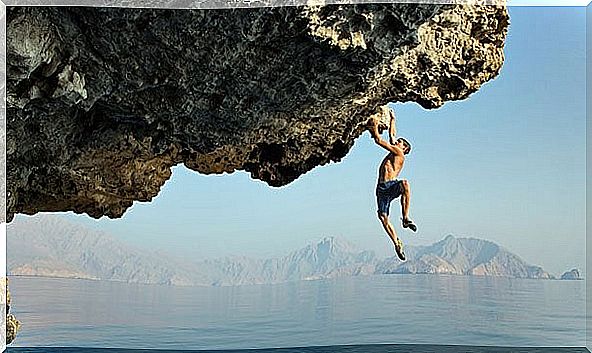Alex Honnold: A Man Without Fear

Alex Honnold’s story is one of the most enigmatic cases in neuroscience. Represents the exception to the rule. One of the fears we all come into the world with is falling. Even babies get scared if they are thrown into the air.
It is an instinctive fear and it accompanies us as part of our genetic makeup. Falling puts our safety and our life at risk. In this case, physiology intervenes and puts fear before risk, as a warning signal.
This is precisely the oddity of Alex Honnold: he is not afraid of falling. He is a 32-year-old mountaineer, born in the United States, who became famous for his reckless exploits. His specialty is “free solo”, solo climbing without protection. Those who practice it know well that being alone, in that context, means exposing themselves to a situation of extreme vulnerability. It is almost suicide.
For Alex Honnold, however, it is normal routine. When he climbs a rock face, with no other tool than his hands, he feels calm, as if he were taking a walk. He is not afraid or apprehensive of any kind; his brain has therefore attracted the attention of neurologists.
Who is Alex Honnold
Every climb is a challenge to death for Alex Honnold. Likes almost vertical surfaces. His clothing and sports equipment are reduced to the essentials. Carry only a bag full of magnesium to dry your hands when they get wet. Climb with only the help of hands and feet.

Honnold already has several world records behind him. Free soloing is his specialty. He is not the only one in the world to do it, but he is the only one to do it at great altitudes and at such levels of difficulty.
To see him he looks like a boy like many others, perhaps a little lanky. His attitude shows that he doesn’t feel different or special. He laughs a lot and is serene. He is aware that he has a dangerous passion. Many of his friends have died in climbs similar to yours. When asked if he is afraid, he simply replies that he accepted the idea of death better than many others.
His mother says Alex was a difficult child, but he denies everything. From a very young age he climbed everywhere. At the age of 10 he began attending a climbing gym and then began with small excursions in the mountains. At 19 he decided to devote himself completely to this activity. He lives in a van and says he has a minimalist ethic.
Alex Honnold’s brain
The exploits of this young man caused such a stir that a group of researchers decided to study his brain. It all started after neurologist Jane E. Joseph overheard an interview from her. From what Honnold said and the way he did it, the researcher was convinced that there must be something abnormal in the mountaineer’s brain. Precisely in the amygdala, the “control unit of fear”.
The University of South Carolina medical school then decided to analyze Alex’s brain. A first magnetic resonance scan made it possible to ascertain that the boy did not have any lesions in the amygdala.
The next step was to submit a series of shocking images to him to gauge his reaction. They realized that Honnold’s amygdala was practically not activating. It had no variation, as if the dangerous situations presented itself had no emotional impact on him.

An interesting panorama
The researchers were able to prove that Alex Honnold does not really feel fear and this conclusion led them to formulate some interesting hypotheses.
In their opinion, it is likely that Alex’s brain has adapted so much to climbing without protection that it has become accustomed to this type of stimulus. What represents a risk for others, represents a completely normal situation for the American climber.
This conclusion opens up new possibilities for research on fear, starting from the hypothesis that habit is a way to cancel it. If we gradually and systematically expose ourselves to the stimulus of danger, we end up considering it as totally harmless. In this way the range of possibilities in therapies to treat fears is greatly expanded.









